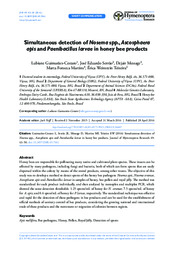Simultaneous detection of Nosema spp., Ascosphaera apis and Paenibacillus larvae in honey bee products.
Simultaneous detection of Nosema spp., Ascosphaera apis and Paenibacillus larvae in honey bee products.
Autoria: GUIMARÃES-CESTARO, L.; SERRÃO, J. E.; MESSAGE, D.; MARTINS, M. F.; TEIXEIRA, É. W.
Resumo: Abstract Honey bees are responsible for pollinating many native and cultivated plant species. These insects can be affected by many pathogens, including fungi and bacteria, both of which can form spores that are easily dispersed within the colony by means of the stored products, among other routes. The objective of this study was to develop a method to detect spores of the honey bee pathogens Nosema apis, Nosema ceranae, Ascosphaera apis and Paenibacillus larvae in samples of honey, bee pollen and royal jelly. The method was standardized for each product individually, and then analyzed by monoplex and multiplex PCR, which showed the same detection thresholds: 1.25 spores/mL of honey for N. ceranae; 7.5 spores/mL of honey for A. apis; and 0.4 spore/mL of honey for P. larvae, respectively. The standardized technique was effective and rapid for the detection of these pathogens in bee products and can be used for the establishment of official methods of sanitary control of bee products, considering the growing national and international trade of these products and the movement or migration of colonies between regions.
Ano de publicação: 2016
Tipo de publicação: Artigo de periódico
Unidade: Embrapa Gado de Leite
Palavras-chave: Apis Mellifera, Bee pathogens, Detection of spores, honey, pollen, royal jelly
Observações
1 - Por padrão são exibidas publicações dos últimos 20 anos. Para encontrar publicações mais antigas, configure o filtro ano de publicação, colocando o ano a partir do qual você deseja encontrar publicações. O filtro está na coluna da esquerda na busca acima.
2 - Para ler algumas publicações da Embrapa (apenas as que estão em formato ePub), é necessário ter, no celular ou computador, um desses softwares gratuitos. Sistemas Android: Google Play Livros; IOS: iBooks; Windows e Linux: software Calibre.
Acesse outras publicações
Acesse a Base de Dados da Pesquisa Agropecuária (BDPA) para consultar o acervo completo das bibliotecas da Embrapa.

